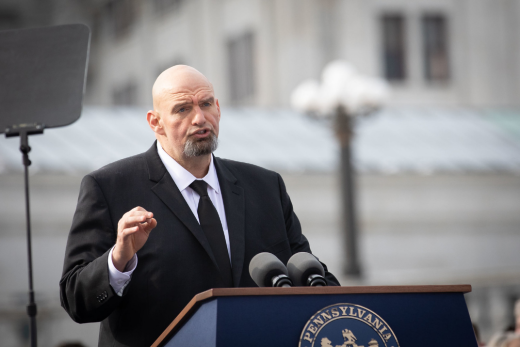By Kim Lyons | Pennsylvania Capital-Star
Since his office announced late last week that he was seeking treatment for clinical depression, there’s been a flood of public support for freshman Sen. John Fetterman, D-Pa., for making his condition and treatment public.
President Joe Biden tweeted a message of support on Friday: “Millions of people struggle with depression every day, often in private. Getting the care you need is brave and important. We’re grateful to you for leading by example.”
But even as he undergoes treatment, Fetterman’s campaign has taken action not to quiet the conversation about depression, but seemingly, to keep it going.
On Friday, Fetterman’s campaign sent an email to his supporters, encouraging people to donate to mental health organizations:
Millions of people struggle with depression every day, and too often, people don’t reach out for help. Seniors, veterans, and millions of people who face the stigma that comes with addressing our mental health can go years without getting needed mental health care.
We’re glad John is setting an example for all of us and we hope that his bravery will encourage people around the country who need help to seek it, too.
In this moment, we’d be really grateful if you would split a donation between the National Alliance on Mental Illness and the Pennsylvania Mental Health Consumers’ Association. 100% of your donation will go directly to these charities.
It’s not the first time the Fetterman campaign opened up its email list and asking supporters to donate to causes.
In 2021, Fetterman’s campaign sent out an email asking for donations to a strike fund for United Auto Workers striking against John Deere. Last May, Fetterman tweeted a request to his nearly 1 million followers asking them to donate to an abortion fund.
To be sure, the headlines about politicians with depression have changed significantly in the five decades since Democrat Thomas Eagleton stepped down as running mate for presidential candidate George McGovern.
Eagleton had received treatment for clinical depression several times in his life, which included electroconvulsive therapy (ECT). That information was made public shortly after the 1972 Democratic National Convention, and McGovern reportedly worried that it would doom the ticket.
Despite the headlines calling for Eagleton to step down, a Time magazine poll at the time found nearly 77% of voters said Eagleton’s diagnosis would have “no effect” on their choice for president. (Also worth noting: after he left the presidential ticket, Eagleton was reelected to the Senate twice; McGovern was trounced in the 1972 general election against Richard Nixon).
Fetterman is receiving inpatient treatment at Walter Reed National Military Medical Center in Washington, D.C., and is expected to be in treatment for several weeks.









